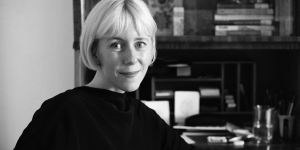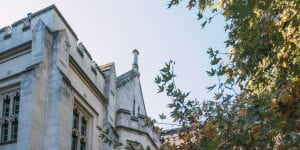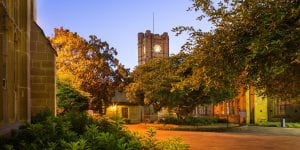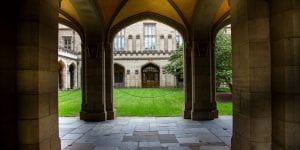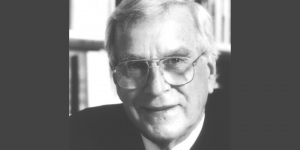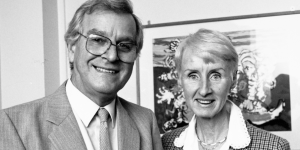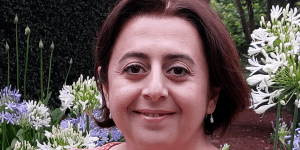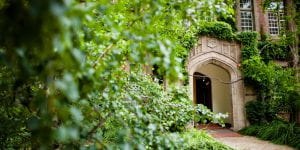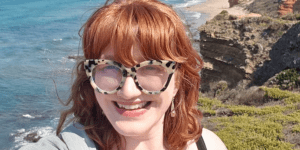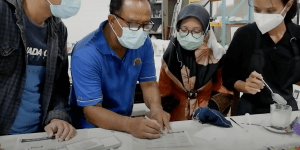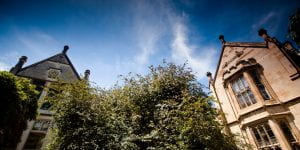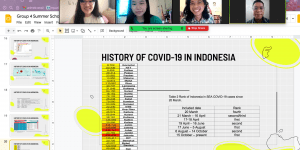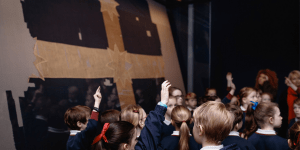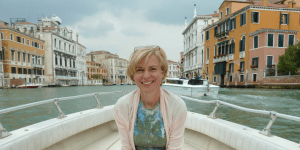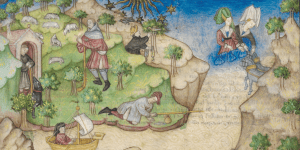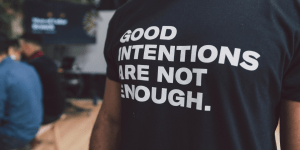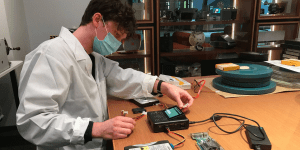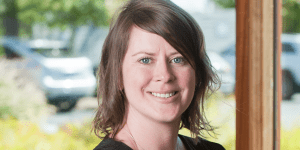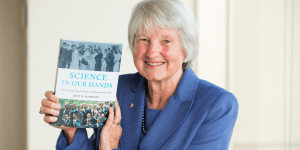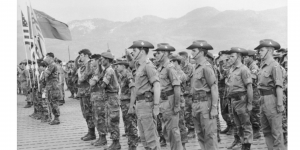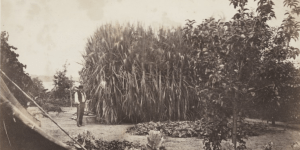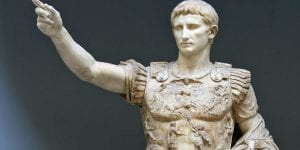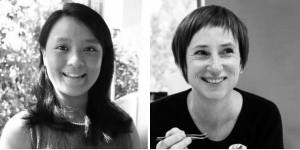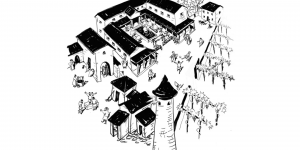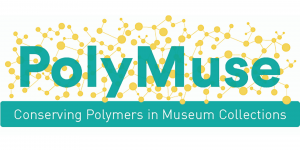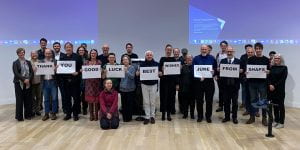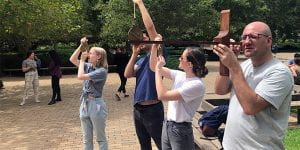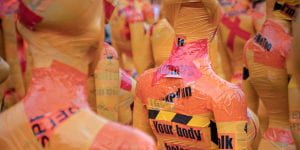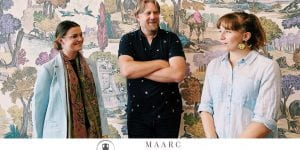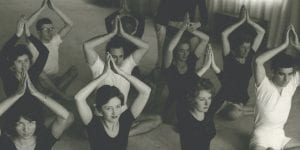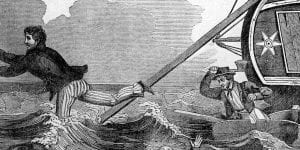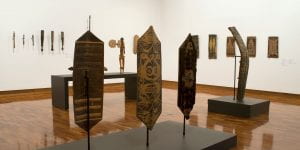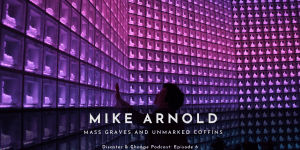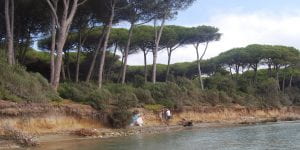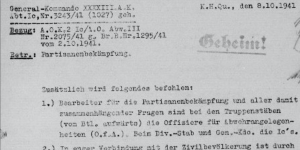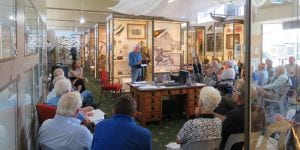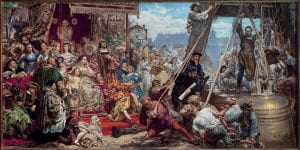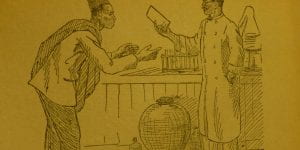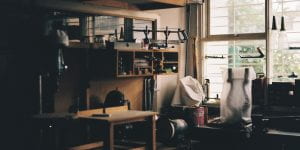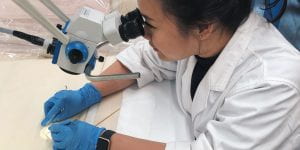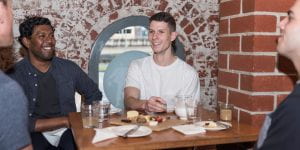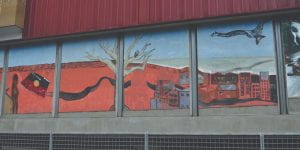dnicole
-
Ainslee Meredith
Ainslee Meredith (PhD in Cultural Materials Conservation, 2021) ‘The Public Value of Conservation in Australia: A Social Justice Framework’ Access to conservation, and thus to cultural heritage, has economic, social and cultural benefits; lack of access can lead to loss, both of cultural materials and of the opportunity to enjoy the benefits stemming from conservation. […]blogs.unimelb.edu.au/shaps-research/2021/11/03/ainslee-meredith
-
Josipa Mickova
Josipa Mickova (MA in Philosophy, 2021), ‘On the Relationship between the Infinite and Finite, and between Adequate and Inadequate Knowledge in Spinoza’s Philosophy‘ The relationship between substance and modes is an enduring problem in Spinoza studies. How this relationship is understood is consequential on all aspects of Spinoza’s tightly knit philosophical system. This thesis focuses […]blogs.unimelb.edu.au/shaps-research/2021/11/02/josipa-mickova
-
Joseph Parro
Joseph Parro (MA in History, 2021) ‘P.R. Stephensen and Transnational Fascism: From Interwar Adoption to Postwar Survival and Transmission’ This thesis examines Percy Reginald ‘Inky’ Stephensen (1901–1965), Australian author, publisher, authors’ agent, and political activist, in relation to the transnational fascist phenomena of the twentieth century. It challenges previous characterisations of Stephensen as an Australian […] -
Paul-Mikhail Podosky
Paul-Mikhail Podosky, ‘Barriers to Change, Possibilities for Resistance: Concepts within Structures of Oppression, Obstacles to Innovation, and the Implementation Challenge of Conceptual Engineering’ (PhD, Philosophy, 2021) Conceptual engineering, when it comes to social kind concepts, has strong political roots within the academy and activist circles alike. But if conceptual engineering, understood as the development of […]blogs.unimelb.edu.au/shaps-research/2021/10/29/paul-mikhail-podosky
-
Alisha Rajaratnam
Alisha Rajaratnam (MA in Philosophy, 2021) ‘Disjunctivism, Perceptual Capacities and Our Point of View on the World‘ Negative Disjunctivism is a frequently misunderstood position. Disjunctivists of this stripe hold that all that can be said about the phenomenal character of a hallucination of an F is that it is introspectively indiscriminable from a veridical perception […]blogs.unimelb.edu.au/shaps-research/2021/10/27/alisha-rajaratnam
-
Greg Dening (1931–2008)
On the occasion of the forthcoming Greg Dening lecture, we thought it timely to republish an obituary for Greg Dening by his former colleague, Emeritus Professor Chips Sowerwine. This obituary first appeared in the Journal of Australasian Irish Studies 7 (2007) and has been reprinted by permission of the journal’s editor. Greg Dening died on 13 […]blogs.unimelb.edu.au/shaps-research/2021/10/27/greg-dening-1931-2008
-
Donna Merwick Dening (1932–2021)
On 23 August SHAPS received the sad news that Donna Merwick Dening had passed away overnight. Donna was an Associate Professor in the History Department from 1969 to 1995 and taught American History. She was teacher, mentor and colleague to many and we mourn the passing of a great historian. Donna was proud of the […]blogs.unimelb.edu.au/shaps-research/2021/10/24/donna-merwick-dening-1932-2021
-
Bengi Selvi-Lamb
Bengi Selvi-Lamb (PhD in Classics & Archaeology, 2021) ‘Kura-Araxes Obsidian: A Case Study from Sos Höyük‘ The Kura-Araxes complex has a distinctive material assemblage that stretched across a wide geographical area from the Transcaucasus, through Lake Urmia basin in Northern Iran to Eastern Turkey and the Upper Euphrates region over at least 1000 years (3500–2400 […]blogs.unimelb.edu.au/shaps-research/2021/10/23/bengi-selvi-lamb
-
Paul Siemers
Paul Siemers, ‘What is the Internet of Things? An Ontological Investigation’ (PhD in the History & Philosophy of Science, 2021) The Internet of Things is widely considered to be of major – and increasing – significance as a global socio-technical phenomenon. However, answering the question of what the Internet of Things is turns out to […] -
Antonia Smyth
Antonia Smyth (MA in Philosophy, 2021) ‘Epistemic Injustice in Cases of Compulsory Psychiatric Treatment‘ There is a growing body of philosophical research into epistemic injustice in the psychiatric context; this thesis examines the impact of this distinct form of injustice on people in compulsory psychiatric treatment specifically, that is, on people receiving treatment without their […]blogs.unimelb.edu.au/shaps-research/2021/10/19/antonia-smyth
-
Bali Art & Heritage Conservation Internship Program #BAHCIP
In mid-2021 a group of alumni of the Grimwade Centre for Cultural Materials Conservation co-organised the Bali Art & Heritage Conservation Internship Program (#BAHCIP). Developed by Saiful Bakhri, Masters of Cultural Conservation 2018 and winner of a Rising Star Alumni Award in 2020, together with Gadis Fitriana Putri, Lia Sumichan and Laila Nurul Fitrani, the […] -
Blake Peter Stove
Blake Peter Stove, ‘The Truth of Heidegger’s Existential Analytic of Dasein‘ (MA in Philosophy, 2021) Martin Heidegger’s Being and Time is an ambitious work that fuses transcendental-ontological and historical themes. Critics have argued that these two aspects of the work are inconsistent and, in light of Heidegger’s substantive claims regarding the historical structure of human […]blogs.unimelb.edu.au/shaps-research/2021/10/17/blake-peter-stove
-
William Tuckwell
William Tuckwell (PhD in Philosophy, 2021) ‘Non-ideal Epistemic Contextualism‘ Epistemic contextualists claim that in order for knowledge ascribing sentences, i.e., sentences of the form ‘S knows that p’, to be true S must meet different epistemic standards in different contexts. Some contextualists, those who I’ll label conversational contextualists, claim that speakers can change which standards […]blogs.unimelb.edu.au/shaps-research/2021/10/15/william-tuckwell
-
The 2021 International Summer School in Transnational History, Yogyakarta, Indonesia
Since 2018, the Universitas Gadjah Mada has hosted an annual International Summer School in Transnational History, bringing together students from across Southeast Asia to live and study together in Yogyakarta, Indonesia. In 2018 and 2019 SHAPS was able to send small groups of students, together with Associate Professor Katharine McGregor, to participate in person in […] -
Submarines and Vaccines: France’s 2022 Presidential Elections
Why do the French elections matter to Australia? More now due to new challenges to France’s commitment alongside Australia in the fraught geo-politics of the Indo-Pacific. Peter McPhee explores the 2022 election campaign in this article republished from Pursuit Will the next President of France be Emmanuel Macron, Marine Le Pen or another of the candidates […] -
The Symbolism of Australia’s Southern Cross
Australia’s Southern Cross has been used on flags and coats of arms since the early colonial period but, despite its endurance, it’s a very difficult emblem for many Australians. Dr Martin Bush, Research Fellow in SHAPS, researches the cultural history of astronomy in colonial- and Federation-era Australia. He tells us more in this article, republished […]blogs.unimelb.edu.au/shaps-research/2021/09/29/the-symbolism-of-australias-southern-cross
-
An Interview with Associate Professor Catherine Kovesi
Catherine Kovesi researches discourses surrounding luxury and consumption in early modern Italy; Florentine and Venetian family history; and Australian religious history. She is Chair of the Australasian Centre for Italian Studies and in recent years has worked with the Australian Council for the Arts at the Venice Biennale Arte. To celebrate Catherine’s promotion to Associate […] -
Equality and Fairness: Vaccines Against this Pandemic of Mistrust
The COVID crisis has laid bare a crisis of trust. In many Western nations there’s a small but significant minority refusing to follow distancing guidelines, wear masks or get a vaccination. Protests in recent weeks have demonstrated just how much they mistrust politicians, scientists, bureaucrats, the ‘mainstream media’ and many of their fellow citizens. And […] -
Why Study Ancient Languages? An Interview with Dr Edward Jeremiah and Dr Andrew Turner
We are excited to announce the appointment of Dr Edward Jeremiah and Dr Andrew Turner as Teaching Specialists in ancient languages. Andrew and Edward play key roles in introducing our students to Latin and Ancient Greek, and guiding them through their journey as they learn to read classical texts in the original language. In addition […]blogs.unimelb.edu.au/shaps-research/2021/08/23/why-study-ancient-languages
-
Confronting Racism in the Sciences: A Resource Set for Scholars
Dr Eden Smith is a Research Fellow in the History and Philosophy of Science (HPS). Alongside their focused research, Eden has been collating resources on key topics in HPS to help facilitate conversations between those who analyse science, such as historians, philosophers, and sociologists of science, and those who practice science. As part of this initiative, […] -
New Media Conservation Fellowship
In early 2021 Jesse Dyer was the recipient of the first Time-Based Media Conservation Fellowship, offered in partnership by the Grimwade Centre for Cultural Materials Conservation and the Australian Centre for the Moving Image (ACMI). This new fellowship supports graduate research in the dynamic field of Time-Based Media Conservation. Samantha Rogers spoke with Jesse about […]blogs.unimelb.edu.au/shaps-research/2021/08/09/new-media-conservation-fellowship
-
Welcome Dr Julia Bowes, New Hansen Lecturer in US History
Dr Julia Bowes joined SHAPS as Hansen Lecturer in US History on 1 July 2021 and will be teaching HIST20071 American History: 1945 to Now in Semester 2/2021. Originally from Sydney, Julia completed her PhD at Rutgers University in 2018 and her doctoral thesis, Invading the Home: Children, State Power, and the Gendered Origins of Modern Conservatism, […]blogs.unimelb.edu.au/shaps-research/2021/07/26/welcome-julia-bowes
-
A Historical View on Physiotherapy at the University of Melbourne
Since retiring from a distinguished career in physiotherapy, Professor Joan McMeeken AM has devoted much time to researching the history of physiotherapy at the University of Melbourne – the first university to teach it in Australia. While formal studies began in 1906, the university only formed a dedicated School of Physiotherapy in 1991 after energetic […]blogs.unimelb.edu.au/shaps-research/2021/07/19/historical-view-on-physiotherapy
-
Peter Yule on Vietnam Veterans and the Victorian Bar
A video recording of Peter Yule's presentation to the SHAPS Fellows & Associates seminar (June 2021).blogs.unimelb.edu.au/shaps-research/2021/07/13/peter-yule-on-vietnam-veterans-and-the-victorian-bar
-
Beyond ‘Statue Shaming’: Grappling with Australia’s Legacies of Slavery
Aboriginal and Torres Strait Islander readers are advised this article contains distressing images and names and/or images of people who have passed away. As countries around the globe struggle to come to terms with the legacies of their imperial and colonial pasts, much debate about truth-telling focuses on how we remember individuals. The statues and […] -
Control & the Imagery of Power: The Case of Emperor Augustus
Episode 1 in the 2021 SHAPS 'Control' Podcast Series: Dr Roslynne Bell (Classics & Archaeology).blogs.unimelb.edu.au/shaps-research/2021/06/28/augustus-public-image
-
The PolyMuse Project: Part II
PolyMuse is one of the major research projects underway at the Grimwade Centre for Cultural Materials Conservation. The primary goal of the project is to develop methods for conserving plastics (polymers) in collections across museums, galleries, and archives. Of particular concern are the five most volatile plastics, cellulose nitrate, cellulose acetate, PVC, polyurethane, and rubber, […]blogs.unimelb.edu.au/shaps-research/2021/06/14/polymuse-project-2
-
What was it Like to be a Child in the Roman Empire?
As the researcher for a new children’s novel set in Ancient Roman times, archaeologist and SHAPS Honorary Tamara Lewit found herself hunting for answers to questions she’d never considered. She tells us about Roman childhood in this new article republished from Pursuit. What would a school day be like in 313 CE? What games would […]blogs.unimelb.edu.au/shaps-research/2021/06/02/what-was-it-like-to-be-a-child-in-the-roman-empire
-
The PolyMuse Project
PolyMuse is one of the major research projects currently underway at the Grimwade Centre for Cultural Materials Conservation. The aim of the project is to develop suitable methods for conserving plastics (polymers) in collections across museums, galleries and even university archives. Of particular concern are the rapidly degrading and highly damaging plastics known as ‘malignant […]blogs.unimelb.edu.au/shaps-research/2021/05/26/polymuse-project
-
Thank You, June McBeth!
June McBeth retired this year after many years of dedicated service to the University of Melbourne. Since 2007, through many changes, June has been a constant, providing excellent support to staff and students in Classics & Archaeology, the Grimwade Centre, History, HPS, Jewish and Hebrew Studies, and Philosophy. June played an absolutely key role in keeping […]blogs.unimelb.edu.au/shaps-research/2021/05/13/thank-you-june-mcbeth
-
Astronomy in World History
One of the most popular subjects in the History and Philosophy of Science program is the second-year summer intensive, Astronomy in World History (HPSC20015). Conducted over ten days, this subject explores the history of astronomy across a variety of cultures including the Babylonian, Ancient Greek, Chinese, Indian and Arabic civilisations. As well as learning through […]blogs.unimelb.edu.au/shaps-research/2021/05/03/astronomy-in-world-history
-
Control 2021–2022
From the Brexit campaign with its call to ‘take back control’, to cultural fashions like the Marie Kondo phenomenon, through to criminological and sociological theories on self-control and socialisation, or political discourses around borders and immigration – everywhere we look, we find evidence of an intense preoccupation with ‘control’. A desire for and a drive […] -
The Life Stories of Gippsland Lakes Fishers
An oral history project involving SHAPS Fellow Nikki Henningham is preserving the memories of the people who fished the Gippsland Lakes before commercial fishing was shutdown. This article, authored by Nikki and republished from Pursuit, explores the project. With little fanfare or attention, commercial fishing in the Gippsland Lakes in eastern Victoria ceased on 1 […]blogs.unimelb.edu.au/shaps-research/2021/04/02/the-life-stories-of-gippsland-lakes-fishers
-
Mediterranean Archaeologists Gather Online
In January 2021, over 200 archaeologists of the Mediterranean came together online for the inaugural Mediterranean Archaeology Australasian Research Community (MAARC) conference. The digital conference, organised by Gijs Tol, Emily Simons, Madaline Harris-Schober, and Larissa Tittl (Classics & Archaeology) surpassed all expectations in numbers of participants and sheer diversity of papers. Emily and Maddi report […]blogs.unimelb.edu.au/shaps-research/2021/04/01/mediterranean-archaeologists-gather-online
-
Gita Yoga: Interview with Dr Fay Woodhouse
In October 2020, SHAPS Fellow Fay Woodhouse released her new book, Gita: Melbourne’s First Yoga School – 65 Years of History, exploring the different phases of Melbourne’s first full-time permanent yoga school, founded in 1954. Nicole Davis chatted to Fay about the book, the history of Gita Yoga, and its place in Melbourne’s and Australia’s […]blogs.unimelb.edu.au/shaps-research/2021/03/25/gita-yoga-interview-with-dr-fay-woodhouse
-
The Truth Behind A Pirate Legend
Benito de Soto was a ruthless and violent pirate, but his story has been rewritten (and reimagined) over 200 years to create his modern rebel reputation. Dr Sarah Craze and Associate Professor Richard Pennell from SHAPS explore his story in this article, republished from Pursuit. You may have already heard of the pirate Benito de Soto […]blogs.unimelb.edu.au/shaps-research/2021/03/23/the-truth-behind-a-pirate-legend
-
Indigenous Culture Collections
In November 2020, the Grimwade Centre – in partnership with Humanities 21 – hosted an online event showcasing Indigenous Collections at the University of Melbourne. The program featured a fascinating cross-section of stories about Indigenous artefacts and the people who create, collect and conserve them, as well as those who draw on them for their […]blogs.unimelb.edu.au/shaps-research/2021/03/15/indigenous-culture-collections
-
Is This the End of the ‘American Century’?
Is the United States’ time in the sun as the world’s superpower coming to an end? While American exceptionalism reigns supreme, the Capitol Hill riots revealed a truth. Hansen Lecturer in Global History Dr Sarah Walsh explores the history of how American foreign policy has been imagined and mythologised in this article, republished from Pursuit. […]blogs.unimelb.edu.au/shaps-research/2021/03/07/is-this-the-end-of-the-american-century
-
Episode 6 in the SHAPS Podcast Series: Professor Mike Arnold
Professor Mike Arnold discusses his research on the intersections between death, technology and society, in this final episode of the SHAPS 2020 'Disaster and Change' podcast series, hosted by Dr Henry Reese. -
Introducing New Lecturer in Gender History, Dr Annabelle Baldwin
Newly appointed Lecturer in Gender History, Dr Annabelle Baldwin, is a specialist in twentieth-century European and global history, with a particular interest in Holocaust studies, focusing on Jewish women’s and girls’ experience of sexual violence during the Holocaust. Annabelle will be teaching two brand-new undergraduate subjects: the first-year subject Gender Rights and Leadership in History […] -
Introducing MAARC: A New Network for Mediterranean Archaeologists in Australasia
In 2020, Gijs Tol (University of Melbourne) and Jeremy Armstrong (University of Auckland) led a new initiative aimed at bringing together Australasian archaeologists of the Mediterranean. The result is a new organisation, MAARC (Mediterranean Archaeologists of Australasia Research Community). MAARC is set to hold its inaugural annual meeting, hosted by the University of Melbourne (in […] -
Scientist and Killer: A Split Life
How does an urbane chemist become a Nazi, then go back to being a respected researcher? And what does it say about the extent of the humanity in all of us? Dr Oleg Beyda explores the story of Hans Beutelspacher in this article, originally published in Pursuit. In his diaries and letters, the World War […]blogs.unimelb.edu.au/shaps-research/2021/01/04/scientist-and-killer-a-split-life
-
Empowering Communities through Shared Learning
For the last nine years, conservator and Grimwade Centre PhD candidate, Sophie Lewincamp, has been investigating how conservators can better engage with community knowledge in a productive and equal way. Combining extensive on-the-ground experience with academic research and critical reflection, Sophie has developed a new community engagement framework called the Tiered Contact Zones Model. In […]blogs.unimelb.edu.au/shaps-research/2020/12/22/empowering-communities
-
The Queen who Defied the Holy Roman Emperor
An Italian-born princess and sole heir to the Sforza dukedom, the life of Bona Sforza helps us understand how elite Renaissance women acquired, maintained and negotiated power. In this article, republished from Pursuit, SHAPS Fellow Darius von Güttner-Sporzynski explores the life of Queen Bona and her legacy. Among the women of the European Renaissance, Bona Sforza […]blogs.unimelb.edu.au/shaps-research/2020/12/20/the-queen-who-defied-the-holy-roman-emperor
-
Looking Back at the 1918 Spanish Flu Pandemic in Colonial Indonesia
Colonial Indonesia was hit especially hard by the Spanish Flu pandemic of 1918–1919, with the highest death rate in Asia after India. History PhD candidate Ravando recently published a book (in Bahasa Indonesia) on this subject, drawing upon archives of the Dutch colonial Civil Medical Service and the contemporary Chinese-Indonesian press. In this blogpost, Ravando […]blogs.unimelb.edu.au/shaps-research/2020/12/15/1918-spanish-flu-colonial-indonesia
-
Documenting the History of Worco Crafts Co-operative
After completing her PhD in History in 2019, Molly Mckew was commissioned to write the history of the Preston-based Worco crafts co-operative, to mark the fortieth anniversary of its founding. The project offered Molly the opportunity to build on her knowledge of the history of Melbourne inner-urban lifestyle experiments of the 1960s–1970s, and to apply […]blogs.unimelb.edu.au/shaps-research/2020/12/11/documenting-the-history-of-worco-crafts-co-operative
-
Cataloguing the University’s School of Chemistry Collection
Grimwade Centre student Lia Sumichan worked in the University of Melbourne’s School of Chemistry Collection as part of the University’s Museums and Collections Projects Program. She told Isabella Walker how unique collection items and inspiring colleagues encouraged a newfound passion for chemistry. -
World AIDS Day: Interview with History Graduate Timothy Krulic
Timothy Krulic is an Honours graduate from the University of Melbourne, having undertaken a combined degree in History and English and Theatre Studies. Since 2015, he has worked at Living Positive Victoria, where he is currently a Health Promotion Officer. Forum’s Nicole Davis interviewed him recently about his current work and how his studies influenced […] -
SHAPS Digest (November 2020)
A monthly roundup of media commentary, publications and projects, and other news from across the School community.blogs.unimelb.edu.au/shaps-research/2020/12/01/shaps-digest-november-2020
-
‘Narratives & Power’: Melbourne Historical Journal Volume 47 Launch
Melbourne Historical Journal (MHJ), our very own postgraduate History journal, launched its much-anticipated Volume 47 on 5 November 2020. Themed Narratives and Power, the 2019/2020 edition features a range of research articles, reviews, lectures, and interviews. Each asks different questions of ‘narratives and power’, exploring themes of justice, representation, heritage, memory and honour. This piece […]
Number of posts found: 447
